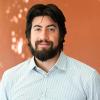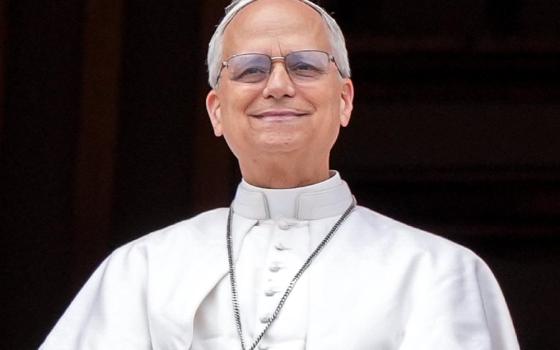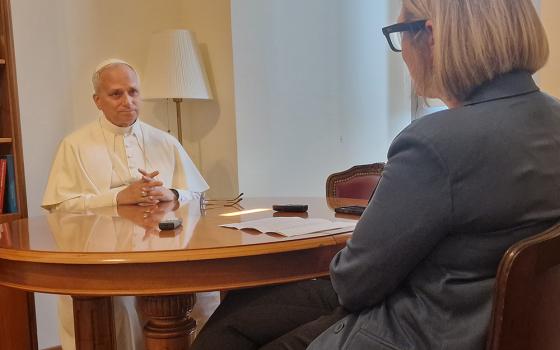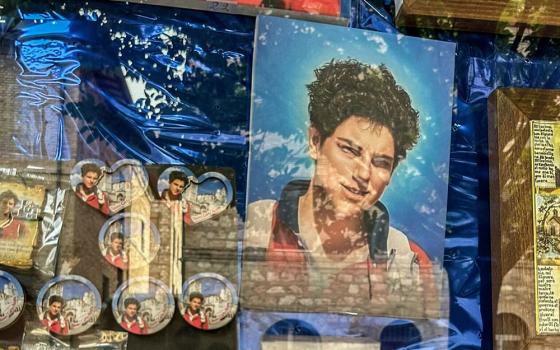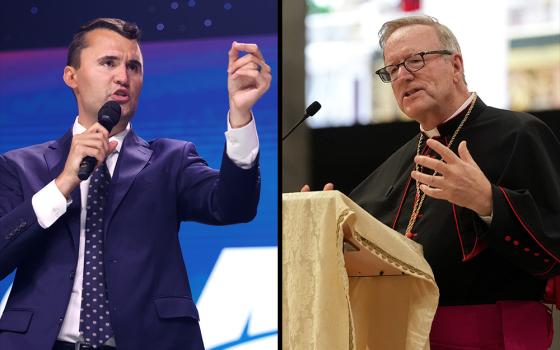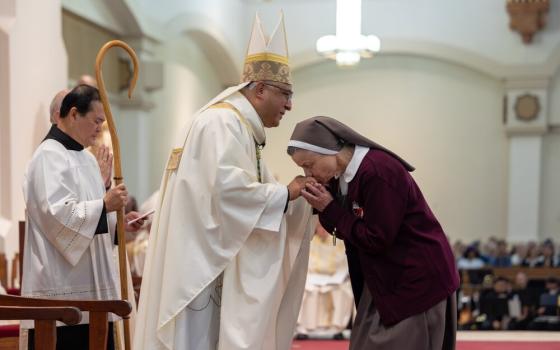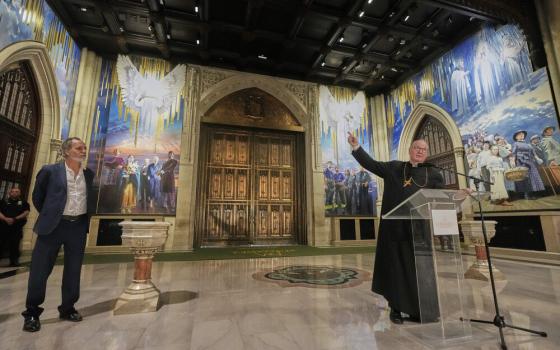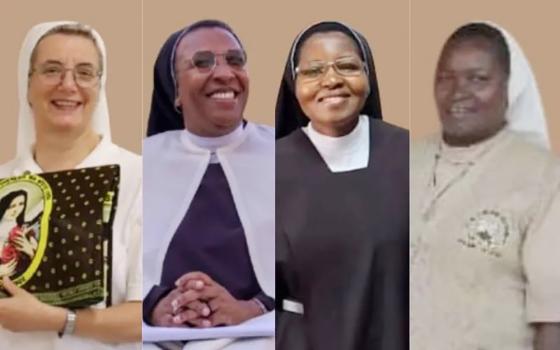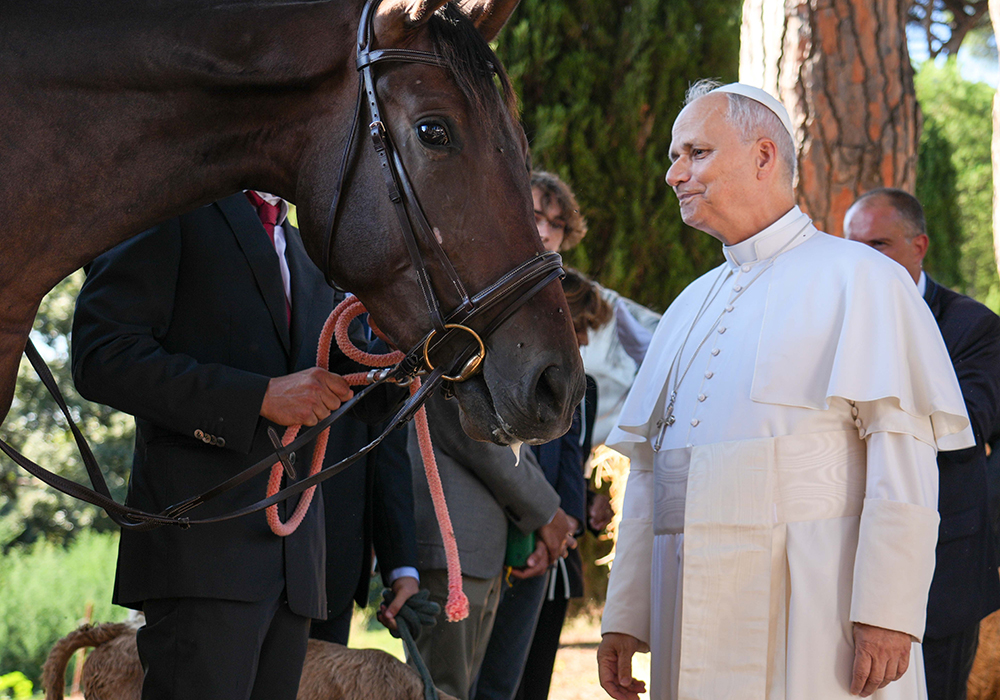
Pope Leo XIV looks at a horse as he greets farm workers in the papal gardens in Castel Gandolfo, Italy, Sept. 5, 2025. The pope inaugurated Borgo Laudato Si' the same day, officially opening the historic papal residence as a center dedicated to the principles of care for creation and human dignity outlined in Pope Francis' encyclical Laudato Si'. (CNS/Lola Gomez)
Extending the legacy of his predecessors who championed environmental responsibility as a core tenet of Catholic social teaching, Pope Leo XIV said that caring for creation "represents a true vocation for every human being."
The pope inaugurated on Friday (Sept. 5) a new center for integral ecology on Vatican-owned property south of Rome, celebrating a Liturgy of the Word and stopping to meet workers, feed fish and pet horses while touring the grounds.
Preaching from within a greenhouse, Leo told cardinals, facility staff and their families that caring for God's creation is "a demanding but beautiful and fascinating task, which is a primary aspect of the Christian experience."
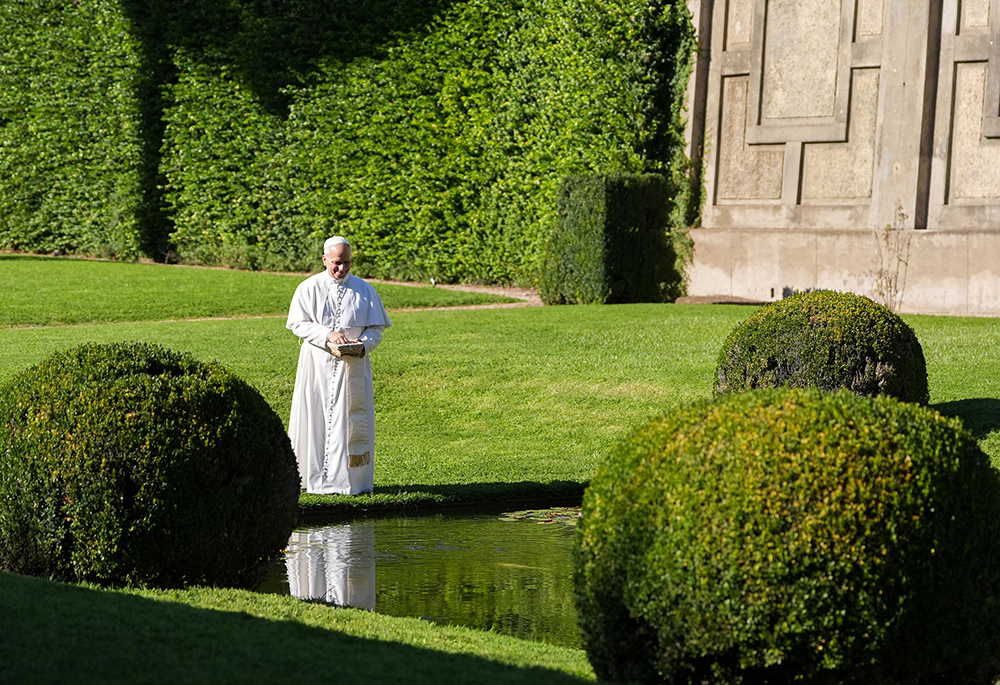
Pope Leo XIV feeds fish at a pond in the Pontifical Gardens of Castel Gandolfo, Italy, Sept. 5, 2025. The pope inaugurated Borgo Laudato Si’ the same day, opening the historic papal residence as a center dedicated to the principles of care for creation and human dignity outlined in Pope Francis’ encyclical Laudato Si’. (CNS/Lola Gomez)
The pope reflected on the reading from the Gospel of Matthew, in which Jesus tells his disciples to learn how to trust in God from the birds and wildflowers, and urged all people to safeguard God's creation "from within creation itself, without ever forgetting that we are creatures among creatures and not creators."
Leo has made it an early priority of his pontificate to move forward on a vision in the Vatican of concern for the environment that stretches back decades. As early as 1970, Pope Paul VI warned of "ecological catastrophe" resulting from unsustainable farming practices. And in 2015, Pope Francis' encyclical "Laudato Si', on Care for Our Common Home" presented environmental care as inseparable from human dignity, which marked a defining moment for the church.
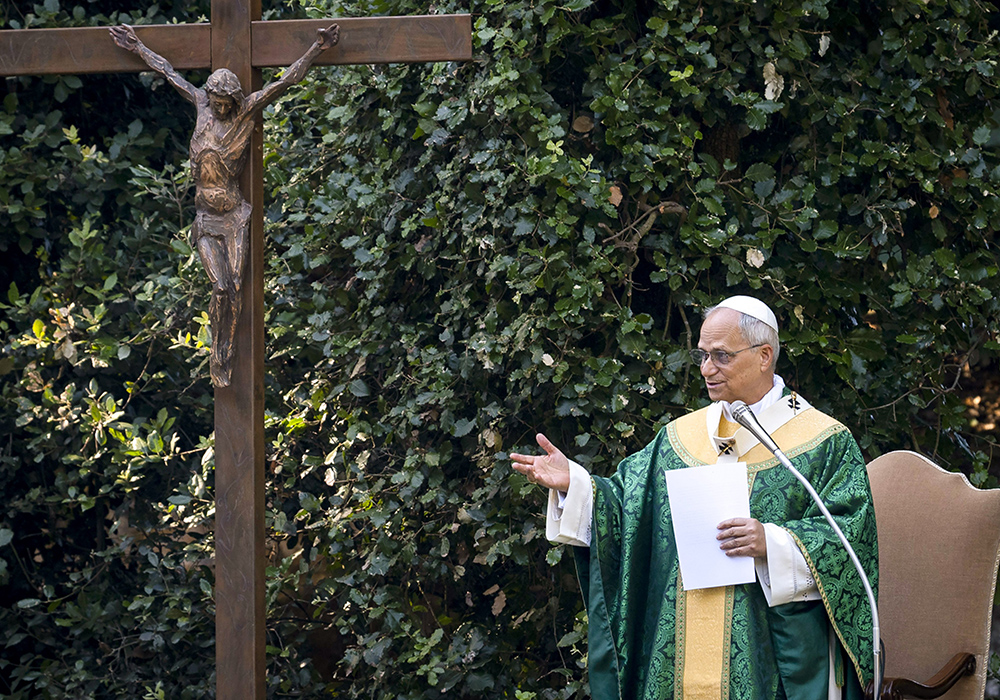
Pope Leo XIV celebrates Mass for the Care of Creation on the grounds of the Borgo Laudato Si’ ecology center in Castel Gandolfo, Italy, July 9, 2025. Leo on Sept. 5 will inaugurate the new center for integral ecology. (CNS/Cristian Gennari, pool)
In July, Leo celebrated a new formulary of the Mass "for the care of creation" at the papal gardens in Castel Gandolfo, and his participation in the inauguration of Borgo Laudato Si', where he will meet its staff and their family members, further confirms that care for creation will remain a central element of papal teaching.
At the new Vatican center however, that teaching will be much more concrete than magisterial documents.
Borgo Laudato Si' seeks to be a "tangible, touchable example of the principles of Laudato Si'," Cardinal Fabio Baggio, undersecretary of the Dicastery for Promoting Integral Human Development and director general of the initiative, told reporters during a press tour of the facilities Sept. 2.
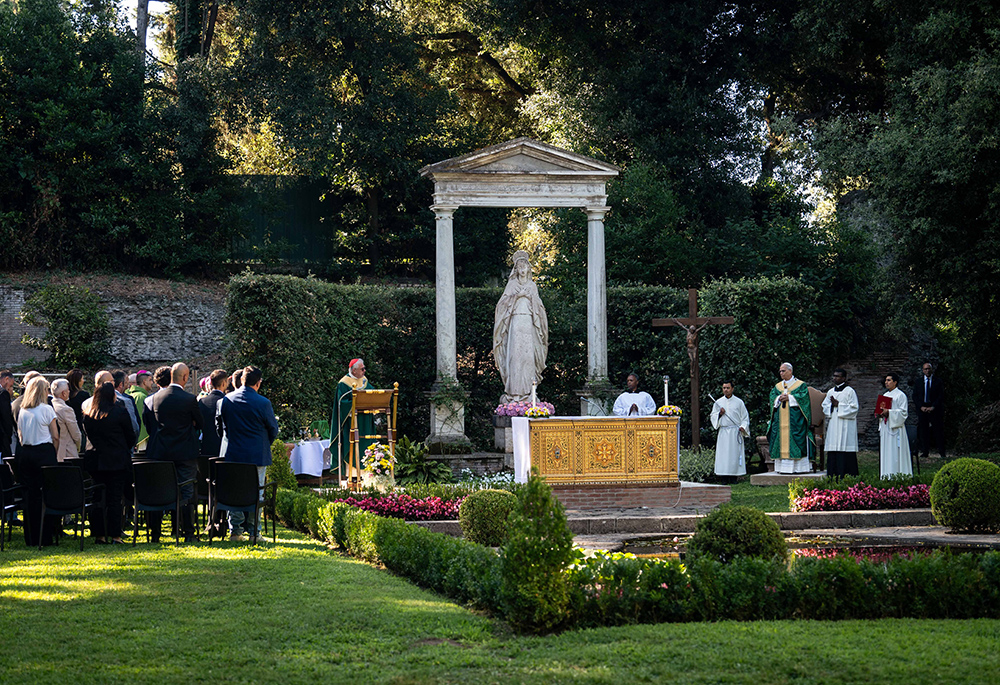
Pope Leo XIV celebrates Mass for the Care of Creation on the grounds of the Borgo Laudato Si' ecology center in Castel Gandolfo, Italy, July 9, 2025. (CNS/Cristian Gennari, pool)
Castel Gandolfo, home to a 135-acre papal summer retreat space larger than Vatican City itself, will serve as the home of the new educational hub named after Francis' encyclical and aimed at amplifying ecological consciousness both within and outside the church.
Baggio said the idea originated in 2022, when Francis asked him to find a new purpose for the gardens and farms at the longtime papal summer residence. By 2023, Francis had approved the cardinal's plan to transform it into a model of sustainable practices and center for higher ecological education.
"I have taught through words," Baggio said the pope told him when discussing the project, "but I have always liked to teach through actions and gestures. Let us make this project a gesture, an embodiment of Laudato Si'."
Meeting with Leo less than a week after his election on May 8, Baggio said the new pope gave him the green light to continue with the project, "and not only this, but also a great blessing to move forward."
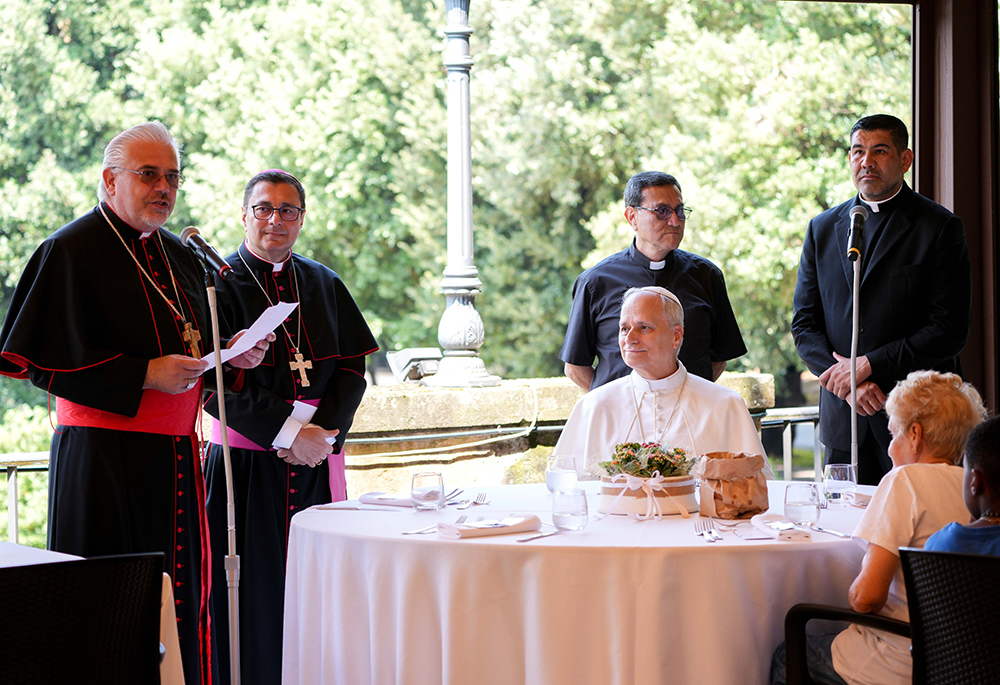
Cardinal Fabio Baggio, undersecretary of the Dicastery for Promoting Integral Human Development, speaks during a lunch with Pope Leo XIV and guests assisted by the Albano diocesan Caritas agency in Borgo Laudato Si' at the papal villa of Castel Gandolfo, Italy, Aug. 17, 2025. (CNS/Lola Gomez)
Inaugurating the center Sept. 5, Leo said it will be "a tangible model of thought, structure and action, capable of promoting ecological conversion through education and catechesis."
"What we see today is a synthesis of extraordinary beauty, where spirituality, nature, history, art, work and technology coexist in harmony," he said. "And all this cannot fail to speak to us of God."
The center's mission spans from environmental education to economic inclusion. Its programs will cater to a wide range of participants — such as schoolchildren and C-suite executives — to engage them in hands-on learning about ecologically sound practices.
Already, the site showcases sustainable innovation: a crescent-shaped greenhouse topped with solar panels that will power the entire facility, high-efficiency irrigation systems, and regenerative farming practices, including an organic vineyard designed to withstand climate stress and expected to yield its first bottles in 2028. Products from the farm will be available for sale and revenues invested back into the project.
Classrooms on the property can hold 300 people at a time to teach sustainable farming practices. Vatican News reported some 2,000 students are expected to undergo programs at the center each year.
Yet those lessons are complemented with fieldwork, quite literally. "One can be a gardener for a half day, or a harvester for a half day," Baggio said.
Advertisement
The public can already access the grounds through tours structured to educate visitors on keywords drawn from Laudato Si', at different locations throughout the site, such as "common home" and "inclusion."
Organizers told reporters that daylong pilot programs with school groups, summer camps and business executives have already taken place, and more immersive residential programs will be rolled out once the site is fully operational.
An executive formation track is also planned, offering small cohorts of business leaders an opportunity to explore Catholic ethics, sustainability and the moral demands of ecological stewardship.
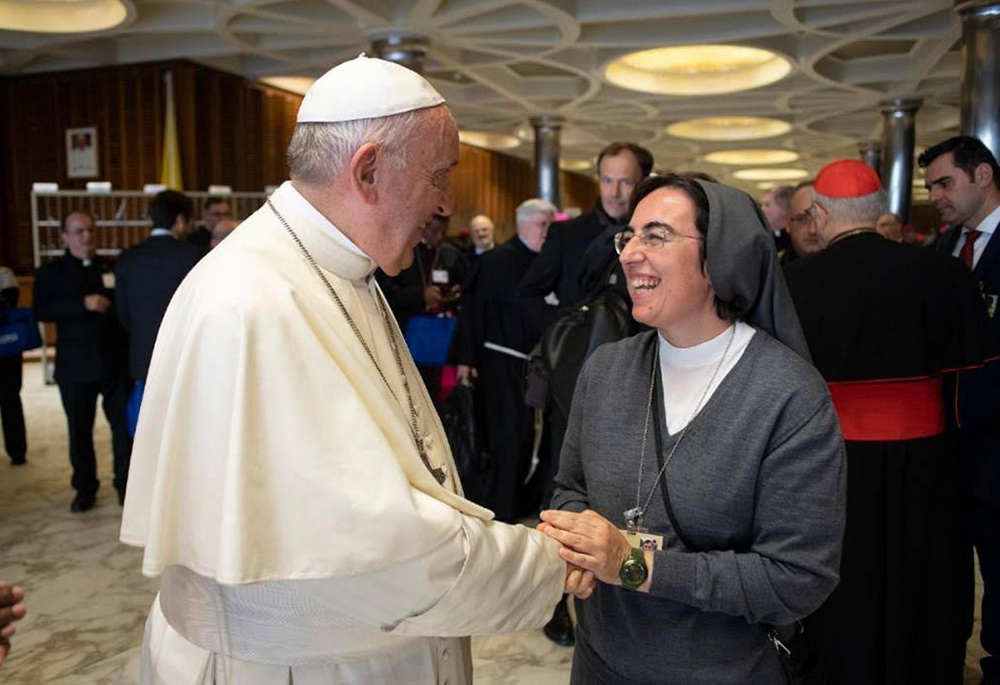
Salesian Sr. Alessandra Smerilli, secretary of the Dicastery for Promoting Integral Human Development, is pictured meeting Pope Francis at the Vatican in an undated photo. Francis named Sister Alessandra to her post in 2021, first as undersecretary then as secretary. Francis died April 21, 2025, at age 88. (CNS/Vatican Media, courtesy of Dicastery for Promoting Integral Human Development)
"Today the world of business moves everything," Salesian Sr. Alessandra Smerilli, secretary of the dicastery and board member of the center, told reporters during the press tour. "If companies move, maybe something will change. So the way for this formation center is that it becomes a place of engagement and, we hope, of change also among business leaders, CEOs, entrepreneurs."
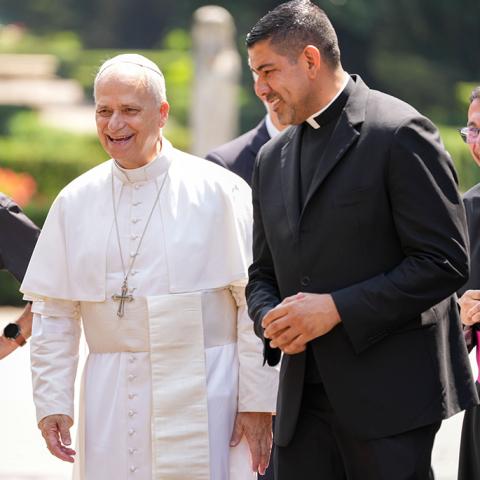
Pope Leo XIV walks with Fr. Manuel Dorantes, a priest of the Archdiocese of Chicago at the Borgo Laudato Si’ in Castel Gandolfo, Italy, Aug. 17, 2025. (CNS/Lola Gomez)
The project will include a vocational program for migrants, refugees and locals with limited access to employment. Participants will be trained and hired for jobs on-site, including at a farm-to-table restaurant that will serve food grown on the property.
Organizers said more than 30 dioceses from Europe, Africa and Latin America have inquired about replicating aspects of the project.
Fr. Manuel Dorantes, a priest of the Archdiocese of Chicago and administrative management director of the center, told reporters that the project aspires to be "an inspiration to church leaders who also have property in their care," emphasizing that it is open to all, regardless of belief.
For young people passionate about environmental justice but not seeing its connection to faith, he added, the Borgo Laudato Si' could represent "a new path of evangelization, because this is a witness much more than words."
"If we want the world to be different, it actually can be different," said Dorantes, "but it takes making the decision."
This story has been updated with reporting about the Sept. 5 inauguration.
The National Catholic Reporter's Rome Bureau is made possible in part by the generosity of Joan and Bob McGrath.
